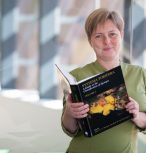DNA reveals the past and future of coral reefs
New DNA techniques are being used to understand how coral reacted to the end of the last ice age in order to better predict how they will cope with current changes to the climate. James Cook Univer

From 2005 to 2022, the main node of the ARC Centre of Excellence for Coral Reef Studies was headquartered at James Cook University in Townsville, Queensland (Australia)








Abstract. Sponges are likely to be the earliest evolved animal lineage, making them key models in studies aimed at understanding evolutionary history of animal genomes. From the morphological and developmental perspectives, sponges combine features of single-cell eukaryotic organisms and the complex multicellular animals. Analysis of the first sequenced sponge genome demonstrated a limited number of homologues of genes involved in eumetazoan development, suggesting a gradual assembly of the complex animal developmental toolkit. However, sponges are a diverse phylum, composed of four distinct lineages. Taking advantage of the accessibility of next generation sequencing technologies, we have sequenced genomes of seven additional sponge species, including six calcareous sponges. For some of these species, we have generated an extensive collection of transcriptome datasets representing embryonic and postembryonic development and regeneration. Comparisons of gene content, with emphasis on developmental regulatory genes, demonstrated unexpected complexity and diversity of developmental toolkits among sponges, suggesting a significant gene loss and family expansions occurring independently in various sponge lineages. Usage of developmental regulatory genes demonstrated deep conservation of body plan patterning and regeneration mechanisms between sponges and other animals, while several conserved and novel genes are involved in formation of calcareous sponge skeletal elements.
Biography. Maja Adamska studied biology in Krakow, Poland, and carried PhD work on function of homeobox genes in inner ear development in Braunschweig and Halle, Germany. During postdoctoral work at the University of Michigan she followed complex crosses of mouse mutants to reveal genetic interactions involved in limb patterning. At that time, she became convinced that the origin of complex developmental toolkits and processes is as exciting as their current function, so in her second postdoc at the University of Queensland she focused on analysis of developmental signalling pathways in the first sequenced sponge, Amphimedon queenslandica. This work revealed surprising similarities in patterning of sponge and higher animal embryos. Maja was a group leader during 2007-2015 at the Sars International Centre for Marine Molecular Biology in Bergen, Norway; in 2015 she became Senior Lecturer/Lab Leader and in 2017 ARC Future Fellow/Associate Professor in the Research School of Biology of the Australian National University. Her group uses calcareous sponges to gain insight into the evolutionary origin of a variety of key developmental processes, including segregation of germ layers and axial patterning of embryos and adults. Maja is also interested in major transitions in animal evolution, such as emergence of multicellularity and morphological complexity, their relationship to genomic complexity as well as effects of environment on animal development.
New DNA techniques are being used to understand how coral reacted to the end of the last ice age in order to better predict how they will cope with current changes to the climate. James Cook Univer
A new study on the effects of climate change in five tropical countries has found fisheries are in more trouble than agriculture, and poor people are in the most danger. Distinguished Profess
James Cook University researchers have found brightly coloured fish are becoming increasingly rare as coral declines, with the phenomenon likely to get worse in the future. Christopher Hemingson, a
Researchers working with stakeholders in the Great Barrier Reef region have come up with ideas on how groups responsible for looking after the reef can operate more effectively when the next bleaching
Abstract: As marine species adapt to climate change, their heat tolerance will likely be under strong selection. Individual variation in heat tolerance and its heritability underpin the potential fo
Abstract: The Reef Ecology Lab in KAUST’s Red Sea Research Center explores many aspects of movement ecology of marine organisms, ranging from adult migrations to intergenerational larval dispersal
Abstract: Macroalgal meadows are a prominent, yet often maligned component of the tropical seascape. Our work at Ningaloo reef in WA demonstrate that canopy forming macroalgae provide habitat for ad
Abstract: Sharks are generally perceived as strong and fearsome animals. With fossils dating back at least 420 million years, sharks are not only majestic top predators but they also outlived dinosa
Abstract: Connectivity plays a vital role in many ecosystems through its effects on fundamental ecological and evolutionary processes. Its consequences for populations and metapopulations have been
Abstract: Evolution of many eukaryotic organisms is affected by interactions with microbes. Microbial symbioses can ultimately reflect host’s diet, habitat range, and even body shape. However, how
Abstract: The past few years have seen unprecedented coral bleaching and mortality on the Great Barrier Reef (GBR) but the consequences of this on biodiversity are not yet known. This talk will expl